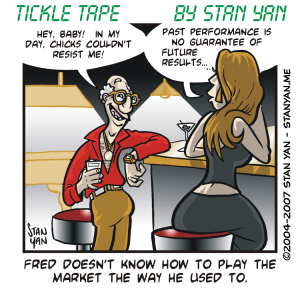The best traders are not self-conscious about their mistakes. They don’t regret past mistakes or worry about the future. They live in the moment and are ready to take new chances to reach new heights. But many traders are stuck. It’s as if they were driving their car up a steep hill and shifted into high gear too early. What happens? They go slower and slower, and their car eventually stalls. At times like these, you need to shift into a lower gear and start over.
Many people can get stuck in their own one-sided, single-minded frame of reference, and when they do, they stall. They badly want to win but can’t climb over the psychological barriers they place in front of themselves. They make trades that are beyond their skills, or trade positions that are too large and require them to take too much risk. They buckle under the added strain and fall. Rather than back off and shift gears, however, they forge ahead, and often end up stuck. Some traders repeat the pattern over and over again until finally, they blow out their account. They are losing ground in high gear and can’t downshift and start over.
Recurrent patterns, such as trading huge positions and losing big, can be the financial death of many traders. It’s vital to change these patterns. In his book “The Psychology of Trading,” Dr Brett Steenbarger argues that these recurrent patterns may be deeply rooted in past childhood experiences. For example, if you put on big losing trades, it may reflect your need to try to gain attention from your spouse or friends. As a child, you may have longed for attention, but never received it. As an adult, you may unconsciously still yearn for attention. You may put on big trades so that you can make a big killing and get the attention you’ve always wanted. Life is rarely that simple, and putting such pressure on yourself as a trader is bound to lead to your demise. What do you do if you are stuck in a trap of self-destruction? Dr Steenbarger suggests, “Invoke old patterns, activate the Observer, shift the mind state, construct new endings.”
Making a change is difficult, but with enough self-insight, and by practising new behaviours, you can change. For example, if you are mounting losses, it’s essential to acknowledge this pattern of self-destructive behaviour. How often are you making losing trades? Do you have good setups or are you trading impulsively just to feel you are doing something? Are you afraid to admit that you have a poor trading strategy? The possible explanations are endless, but whatever they are, it is vital to acknowledge them.
It’s hard to acknowledge what you are doing wrong. If you have trouble, you may want to seek the advice of a third, objective party, such as a trading coach. By working with a coach, you can admit what you are doing wrong, relieve some psychological pressure, and invoke the Observer in you. While caught up in a psychological rut, it can be hard to see ourselves from a god’s eye view. We are stuck and can’t see that in reality, we are making a few dumb mistakes, such as trading beyond our skills or trying to accomplish impossible trading feats. Stepping away from the situation helps us see things from a new perspective. Once we see things from a new perspective, we can change our mental state, and construct new, successful endings.
Here’s how it may work. Suppose you were making huge trades, stressing yourself out, and ending up panicking at critical moments during trades. There’s a simple solution, but many people don’t emotionally see it: trade smaller. Intellectually, they know they should trade smaller, but their ego and emotions won’t let them admit the inadequacy of their actual level of skill, so they make big trade after big trade, and mount losses.
If they saw the consistent pattern of trading beyond their skill level, they would trade smaller positions, and take home modest profits. Why don’t they do it? It is harder than it sounds. Traders want to make money, and making huge profits requires risk. Many traders can’t allow themselves to write a new happy ending to their trading exploits. They see trading the markets prudently and steadily as boring.
It will take too long to get where they want to be, and can’t see patiently working toward their goals. The rewards don’t match the effort in their minds. This kind of thinking, however, will compel you to take large, destructive risks, and in the long run, you will end up losing big. But if you acknowledge the pattern of self-destruction, the negative consequences for you, and accept more modest goals, you will increase the odds of learning how to trade profitably. So if you are stuck in a losing rut, don’t be afraid to identify what you are doing wrong. Figure out a way to trade differently, and work hard to make a change.


